Bayern Munich have played 37 matches across all competitions this season, and they've lost three -- all by one goal, all on the road. They're favorites to win the Bundesliga for the 11th straight season. They've won all eight matches they've played in the Champions League so far, including a pair of doubles over Barcelona and Paris Saint-Germain, runaway leaders in two of Europe's other five major leagues.
Bayern's big bet, then, seemed like it was paying off. In 2021, they gave €25 million to RB Leipzig so 33-year-old manager Julian Nagelsmann could break his contract and come to Bavaria. Ever since Pep Guardiola left Germany in 2015, the club had been not-so-quietly looking for another tactically innovative coach who would bring Bayern back to where they were with Pep: redefining how the game might be played. By locking up the never-afraid-to-experiment Nagelsmann on a five-year deal worth around €40 million, it seemed like they'd found him.
You know ... or not. On Friday, Bayern shocked the world by cutting ties with Nagelsmann and almost immediately replacing him with Thomas Tuchel.
As my colleague Gabriel Marcotti outlined over the weekend, the decision seems like it was driven by a combination of factors that extended well beyond just results. Ahead of this weekend's Der Klassiker with league ledgers Borussia Dortmund (live on ESPN+), let's take a look at the numbers -- and see if we can figure out what the heck just happened.
2.1
We'll start with the simplest one. Bayern Munich have won every Bundesliga title since the 2011-12 season. Through 25 league matches this year, Bayern are averaging 2.1 points per game -- or, their lowest rate since 11-12, when they averaged 2.0 points per game through 25 games and ultimately finished eight points back of Jurgen Klopp's Borussia Dortmund.
- Watch LIVE: Bayern Munich vs. Borussia Dortmund, Sat. 4/1, 12 p.m. ET, ESPN2/ESPN+
- Stream on ESPN+: Bundesliga, more (U.S.)
In 2011-12, Bayern also made it to the Champions League final and somehow lost to Chelsea in penalties after one of the most freakish, lopsided draws you will ever see:
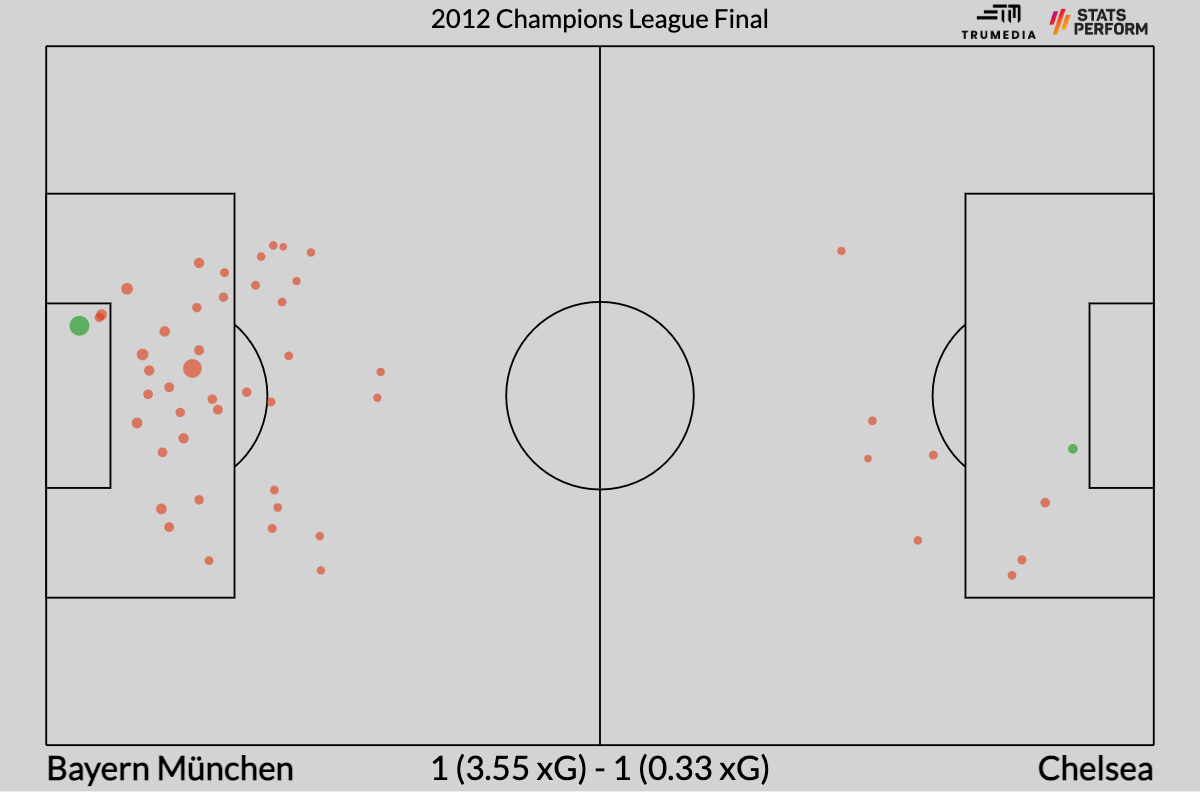
Bayern attempted 43 shots. Chelsea took just nine.
2
Of course, Bayern have lost only three games all season. So, why don't they have more points? Well, they can't win one-goal games. Twelve of Bayern's Bundesliga matches this season have been decided by one goal or fewer; they've won two, lost three and drawn seven. Their 13 points from one-goal games are actually tied for the third-worst mark in the league.
Now, it's tempting to draw all kinds of conclusions from that information. They're flat-track bullies! They don't have that title-winning quality of finding ways to win even when you play poorly! They're scared of the grind!
Perhaps that's how the club hierarchy felt, but there's really no magical ability that allows a team to win one-goal games at an especially high rate. Whenever a team goes on a run of one-goal wins it certainly feels like there's something special going on: a team that just won't quit, a collective ability to push all the way until the end. However, the main predictors for how many games you win by one goal are simply how many games you win in general and by how much you outscore your opponents -- which makes Bayern's one-goal record especially weird and incredibly unlikely to continue.
Plus-45
Here's how the 18 Bundesliga teams compare, simply by goals scored and goals against:
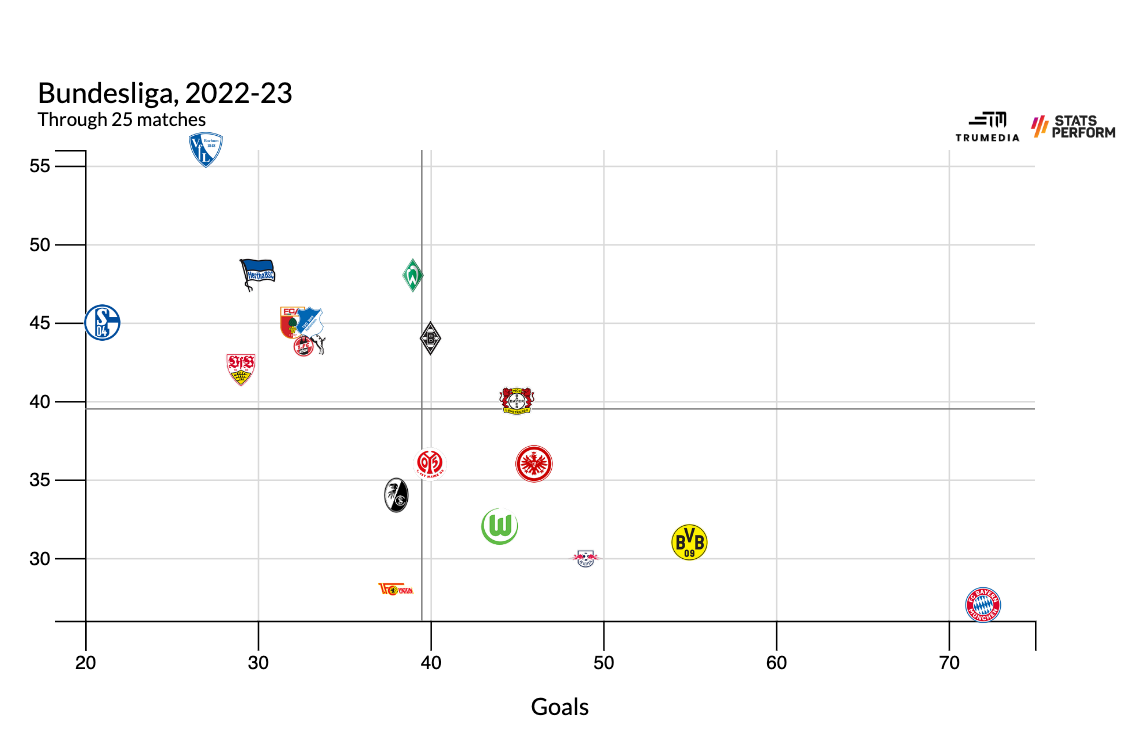
And here's how they stack up by goal differential:
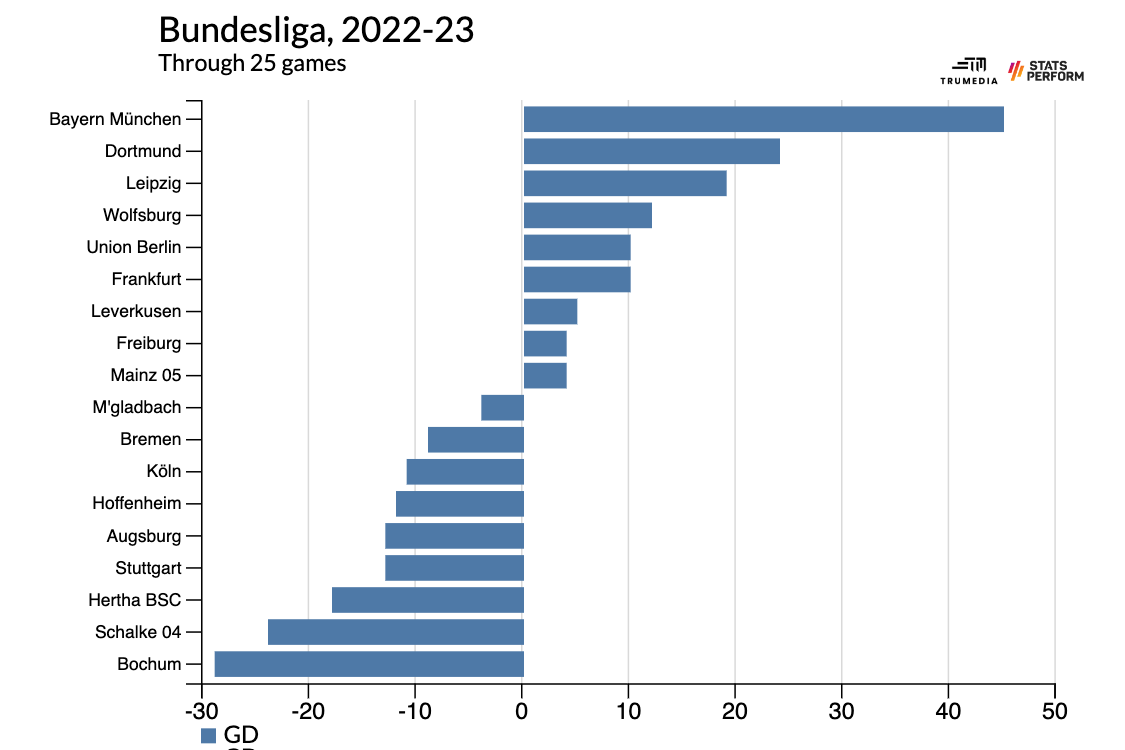
What you're seeing here: Bayern have scored 17 more goals than any other Bundesliga team, and they've also conceded fewer goals than anyone else in Germany. They're the best attacking team and the best defensive team in the league -- and somehow, they're in second place.
Now, despite outscoring their opponents to a dominant degree, Bayern have slowed down from last season. Through 25 matches in Nagelsmann's first campaign with the club, they produced a plus-49 goal differential. That's not worth the seven extra points they had last season compared to this -- 59, down to 52 -- but there has still been a minor decline.
By the underlying numbers, there has been a more-than-minor dip. After a massive improvement in shot creation and suppression in Nagelsmann's first season, Bayern have dropped back down to where they were in Hansi Flick's last season with the club:
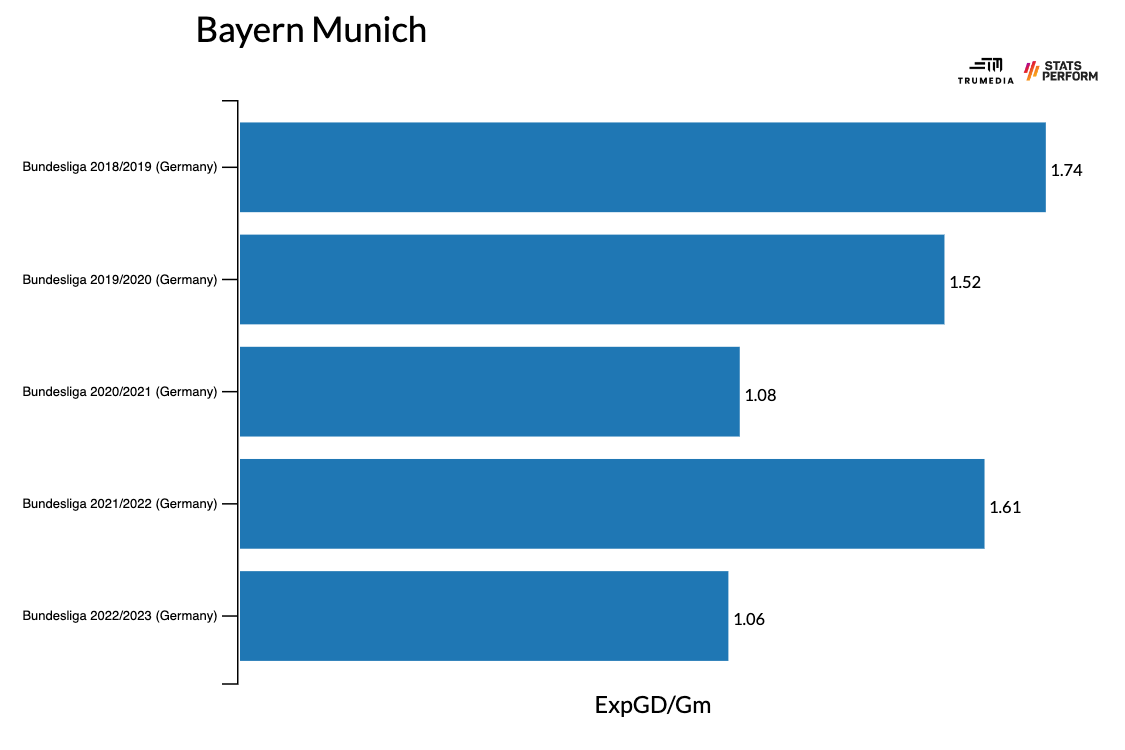
These are still by-far-best-in-Bundesliga numbers, and it's not like this front office has used predictive fundamentals like expected goals to make decisions in the past. Niko Kovac was fired months into the 2019-20 season.
0.72
The biggest reason for Bayern's decline doesn't have anything to do with Nagelsmann's tactics or man management.
Last season, Bayern Munich had Robert Lewandowski, who scored 30 non-penalty goals in 34 starts, or 1.01 per 90 minutes. This season, Bayern's center-forwards (as labeled by Stats Perform) are combining for 0.72 non-penalty goals per 90 minutes.
With Lewandowski off to Barcelona, the center-forward position has been occupied by a combination of aging and out-of-position players. Sadio Mane, who turns 32 next month, was signed from Liverpool as a theoretical Lewandowski replacement despite spending most of his career, outside of a couple months at the tail end of last season, on the wing. A pre-World-Cup injury meant he has played in only 49% of the available minutes.
Thomas Muller, now 33 and more of a quasi-No. 10 than a No. 9, has spent some time at center forward, too, but has featured in just 47% of the minutes, after 84% last year. Then, there's Eric Maxim Choupo-Moting, a journeyman squad guy whom everybody loves, but who played 344 minutes last year and has already played more than 1,000 minutes this season.
Bayern Munich lost arguably the best striker in the world over the summer ... and then didn't sign a replacement striker. What did they expect?
9
If you watched Chelsea's second-leg victory over Borussia Dortmund in the Champions League, you were probably thinking to yourself at some point ... that's the team in first place? After taking a 1-0 lead into Stamford Bridge, Dortmund really struggled against the 10th-place team in the Premier League. Although Chelsea have barely scored over a goal per game in domestic play -- 29 in 27 matches -- they created more than enough chances to flip in the result in regulation:
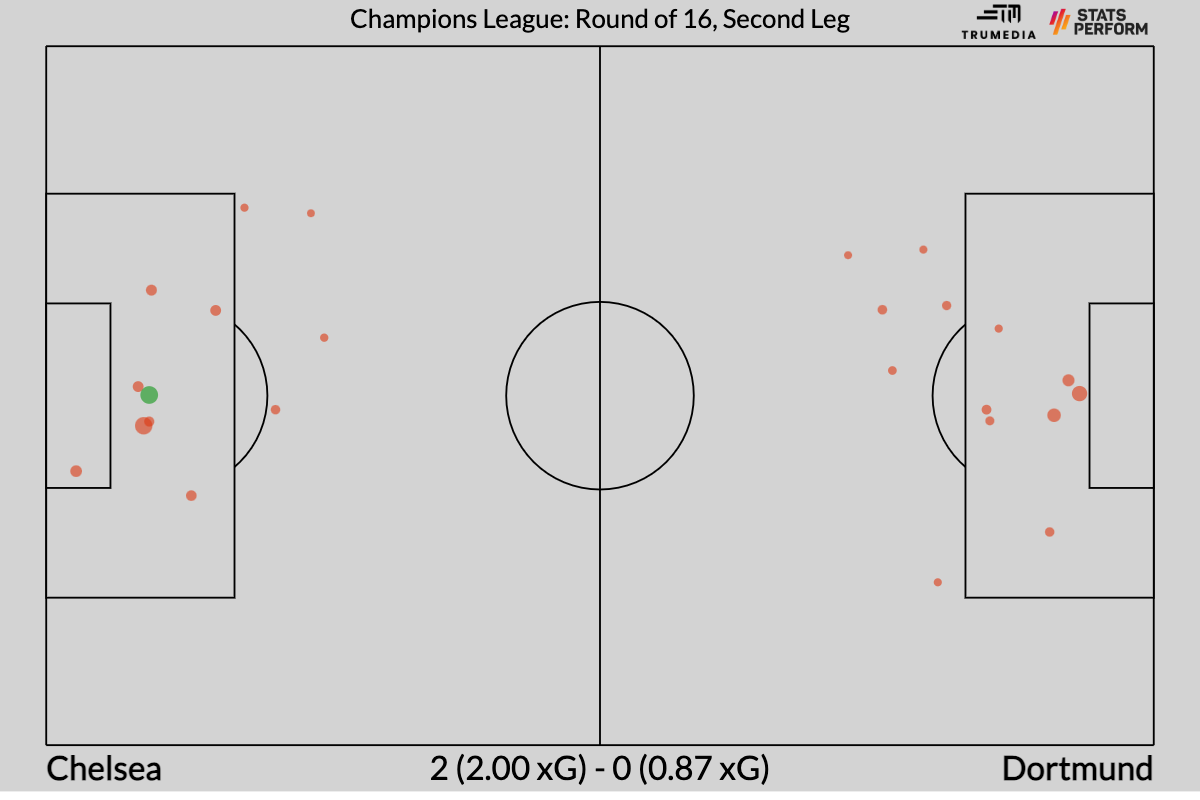
While Dortmund didn't play particularly well in London, that game wouldn't have left you with the wrong impression of the quality of Edin Terzic's side. Compared to the previous four seasons, Dortmund are averaging their second-worst xG differential (plus-0.55) and controlling their lowest share (57%) of final-third possession. They're also allowing more shots and touches inside the penalty area than at any point over that stretch.
Hell, the fancy indicators aren't even necessary to get the point across. Over the past five seasons, Dortmund have averaged a plus-1 per-game goal differential in the Bundesliga. This season: a plus-1 per-game goal differential. And over the past five years, they've averaged 2.1 points per game. This season: 2.1 points per game! While maintaining their level of performance after losing potentially the best soccer player on Planet Earth over the summer is impressive -- Jude Bellingham is quite good! -- their level of performance hasn't been enough to win the league in a long time.
While Bayern's struggles in one-goal games has helped close the gap, Dortmund's dominance in the same matches has pushed them past their much richer rivals. Across the Big Five leagues, only Barcelona, Paris Saint-Germain and Real Betis have won more one-goal games than Dortmund's nine. And that comes from just 13 total one-goal games. Their win percentage in one-goal games is 69%, while their win percentage in all games is actually slightly lower, at 68%. That's not how it's supposed to work.
Even though there's a clear gap in quality between the two sides -- FiveThirtyEight rates Bayern as the second-best team in the world and Dortmund as the 16th best -- the one-point lead for the underdogs and the nine games remaining mean they have a very real shot at winning this thing.
Right now, their odds, per FiveThirtyEight, sit at 26%. An away win against Bayern this weekend would bump that up to 61%, while a draw would jump them up to 34%. Even with a loss, they'd still stand a 14% chance of taking home the title.
5
Some of the other reported factors behind Bayern's decision to move on were Nagelsmann's inability to connect with the team's senior players and the opportunity cost of not hiring Tuchel and seeing him sign somewhere else. While we've seen Tuchel come in midseason, turn around a team's season and win a Champions League title, Bayern were doing perfectly in Europe -- literally -- and it's unclear that Bayern need anything beyond "better luck in close games" to actually turn the season around.
Instead, at least in the short term, they seem to have created some potential downside for themselves.
Tuchel's first match in charge is their most important domestic match of the season. Then they have the first leg of the Champions League quarterfinal at Manchester City just a week and a half after that. While the team was performing well enough to successfully navigate those games under Nagelsmann, they've suddenly introduced all kinds of uncertainty at the critical moment of the season.
If the team takes a couple matches to get hip to Tuchel's demands or Tuchel takes a few games to figure out his preferred lineups, it's not like they have matches against a Bundesliga bottom-feeder and a European minnow that they could win without functioning at full tilt. Given the upcoming schedule, any immediate growing pains are going to drastically affect their title odds in both the Bundesliga and the Champions League.
Most likely, though, Bayern will continue to play at an elite level because Tuchel has a long history of overseeing elite teams -- and because they were already playing at an elite level under Nagelsmann. As for the idea that the famously prickly Tuchel will bring some man-management harmony to the team that Nagelsmann couldn't? It doesn't pass the smell test; Tuchel has fallen out with the hierarchy at each of the previous three clubs (Borussia Dortmund, Paris Saint-Germain and Chelsea) he has managed.
But perhaps that doesn't matter. After Guardiola lasted for three seasons, none of Bayern's next five managers have even made it to the end of their second full campaign. Why'd they change coaches all of a sudden? Because they're Bayern Munich. It's just what they do.
